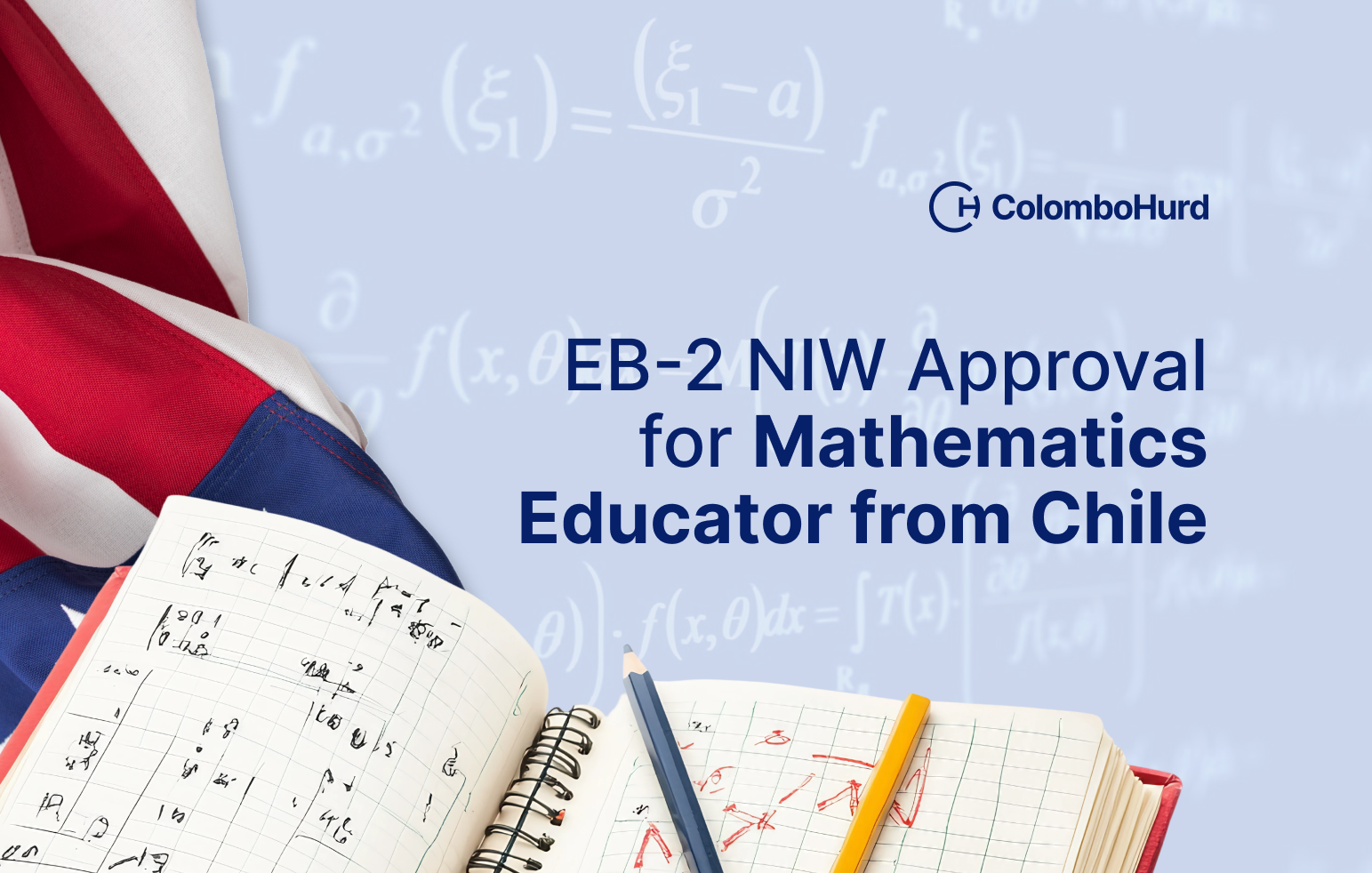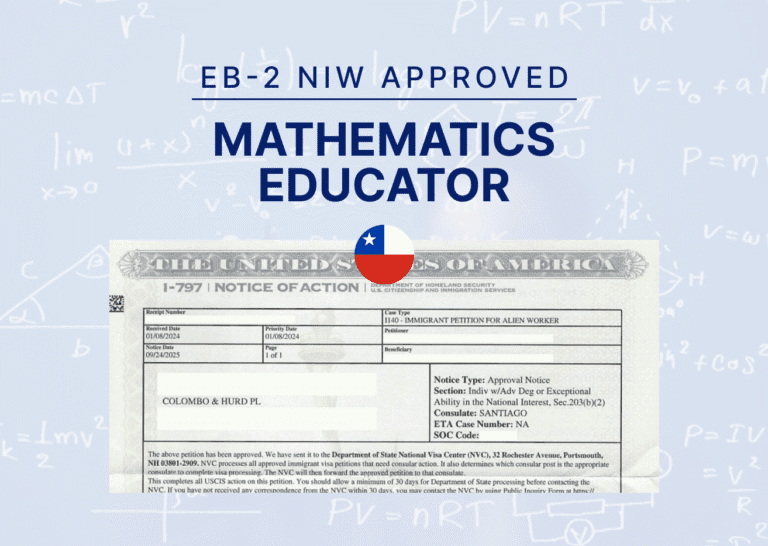Educator
Demand for mathematicians is soaring, projected to grow 30% by 2032. Yet qualified math teachers remain scarce, especially in underserved areas. This shortage may impact economic growth, innovation, and the United States’ global competitiveness. Addressing it will be important to ensure continued progress.
A talented Chilean educator is working to improve how American students learn math. She applies innovative, inclusive teaching strategies and tailored curricula to help underserved learners build strong foundations and pursue STEM careers.
On September 24, 2025, Colombo & Hurd secured an EB-2 National Interest Waiver (NIW) approval for her proposed work in advancing STEM education, equity, and U.S. workforce development.

Empowering Students Through Inclusive Math Education
Bridging educational disparities and igniting STEM enthusiasm, a Chilean mathematics educator is reshaping how underserved students experience mathematics. Holding a bachelor’s degree in mathematics and computer science with a focus on teaching, she brings over 10 years of experience guiding learners to success. Throughout her career, she has designed tailored study plans, engaging activities, and adaptive teaching methods that help students overcome challenges and improve academic performance.
Proficient across algebra, geometry, trigonometry, statistics, and advanced math, she has achieved high student success rates and earned recognition for her dedication to equity. Now, she aims to strengthen U.S. math education with standards-aligned curricula, personalized support, and strategies that improve national test performance and open doors to STEM careers. Her vision has attracted interest from colleagues and key stakeholders, underscoring the potential and lasting impact of her work in the United States.
Key Issues International Educators Encounter in EB-2 NIW Cases
Even though our client spent more than a decade helping students with learning difficulties succeed in mathematics, pursuing an EB-2 NIW can be difficult for teachers because their work is rarely documented through research papers or patents.
To gain approval, the petition needed to prove that her plan to strengthen math instruction was important to the United States, not just a single community. USCIS often questions whether a new teaching initiative can achieve impact on a national scale. The filing had to show that her proven record of improving student performance, her curriculum development, and the interest already expressed by U.S. educators provided a realistic foundation for success.
Nicolás Vargas, Senior Attorney at Colombo & Hurd, explains how EB-2 NIW petitions for teachers require a different approach than those for researchers. While researchers often rely on publications, patents, or funded projects to show national importance, teachers typically demonstrate impact through student performance and local results, which can be harder to scale.
“A strong EB-2 NIW case must connect classroom success to national priorities,” Mr. Vargas notes, “showing that teaching methods are replicable and scalable, improve educational quality, and help build the future STEM workforce.”
How an Educator’s Vision Became a U.S. National Priority
Our legal team built a clear petition that positioned the educator’s work as a model of national progress, beyond a single classroom. The filing documented a decade of measurable student improvement and included testimonials from educators who saw firsthand how her methods raised comprehension and test performance where conventional approaches failed.
The legal team demonstrated how strengthening math education directly supports the U.S. STEM talent pipeline, laying the groundwork for growth in science, technology, engineering, and related fields. The petition connected her work to the broader national goals of advancing economic opportunity, supporting U.S. competitiveness, and expanding the pool of skilled STEM professionals.
The petition also highlighted her inclusive approach, aligning with the United Nations Convention on the Rights of Persons with Disabilities (CRPD). Her methods remove barriers and create equitable opportunities for students with diverse needs.
“Addressing the shortage of qualified STEM teachers is increasingly relevant to EB-2 NIW cases because it’s a clear national priority tied to U.S. economic strength and security,” noted Senior Attorney Vargas. “Educators who improve STEM learning through updated curricula or teacher training can show national importance by advancing technology leadership, economic growth, and competitiveness.”
The case was reinforced with hard data: the U.S. Bureau of Labor Statistics projects a 30% increase in math-related jobs by 2032, while national reports warn that teacher shortages threaten both innovation and long-term growth.
See if you qualify
Get your free EB-2 NIW visa profile evaluation today.
EB-2 NIW Granted, Validating STEM Education Priority
On September 24, 2025, USCIS approved the EB-2 NIW for our client, recognizing the educator’s impact and the national value of her inclusive mathematics approach. The officer accepted that an educator’s impact on student achievement, especially in high-demand fields such as mathematics, can meet the national interest standard even without academic publications.
“This decision reflects a growing understanding that effective teaching, curriculum design, and instructional improvement create benefits that reach far beyond individual schools,” observes attorney Nicolás Vargas. “Such work supports critical national priorities like STEM readiness and workforce development.”
Mr. Vargas adds that STEM educators can build strong EB-2 NIW petitions by linking classroom results to national policy goals and presenting clear evidence such as improved student performance, adopted curricula, or teacher training initiatives. Demonstrating that these methods are replicable and scalable helps prove an impact that advances U.S. innovation and workforce development.
“This approval shows that USCIS is recognizing classroom innovation and measurable student outcomes as valid evidence of national importance. STEM educators can qualify for the EB-2 NIW by proving their methods are scalable, improve achievement, and strengthen the future workforce.”


